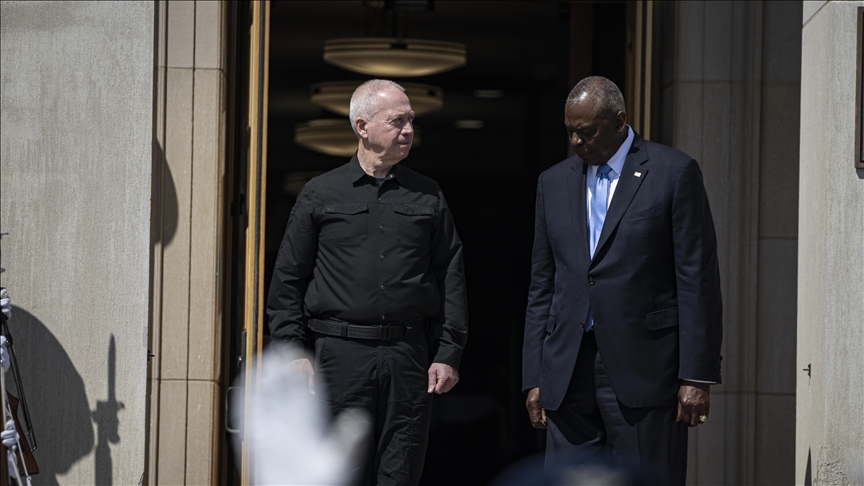

By Anadolu Agency
WASHINGTON
US Secretary of Defense Lloyd Austin informed his Israeli counterpart about Washington’s “future defensive force posture changes” in the Middle East, the Pentagon said on Friday.
“Secretary Austin spoke with Israeli Minister of Defense (Yoav) Gallant this morning about the destabilizing threats posed by Iran, its partners and proxies.
“The secretary reiterated ironclad support for Israel’s security and informed the minister of additional measures to include ongoing and future defensive force posture changes that the department will take to support the defense of Israel,” Deputy Pentagon Press Secretary Sabrina Singh told reporters.
Austin and US President Joe Biden have engaged in close conversations about future changes, Singh added.
Her remarks came amid reports that the US is poised to move resources to the Middle East if needed to defend itself and its allies, including Israel.
“The secretary will be directing forthcoming force posture moves to bolster our force protection. So, there’s a commitment that was made in the call with the president and (Israeli) Prime Minister (Benjamin) Netanyahu, in terms of what specific units, what specific capabilities.
“That’s something that the secretary will decide. I don’t have an exact timeline of when that decision will be made, but that was a commitment that the president reiterated to Prime Minister Netanyahu,” she said.
When asked what specific assets will be moving to the region, Singh said: “I just don’t have that for you right now.”
On Thursday, Biden and Netanyahu discussed US military deployments to support Israel against various threats in a phone call, with Biden reaffirming his commitment to Israel’s security against all threats from Iran.
“The President discussed efforts to support Israel’s defense against threats, including against ballistic missiles and drones, to include new defensive U.S. military deployments,” the White House said in a statement.
Further escalation in Middle East ‘not inevitable’
Singh reiterated that the US will always take measures necessary to ensure American service members’ safety in the region.
Stressing that the Washington does not want a regional war, she said: “We do not see this spilling out into a larger regional conflict, but we will take action to protect our forces anywhere in the world.”
The US is “very clear” about the defensive capabilities that it is committing to the region and its intentions to bolster them, she said, adding that Washington does not want tensions to continue to rise.
“Secretary Austin highlighted that further escalation is not inevitable, and that all countries in the region would benefit from a de-escalation in tensions, including through complete cease-fire and hostage release deal,” Singh added, referring to the ongoing fighting in the Gaza Strip.
Nearly 39,500 Palestinians have been killed over a period of almost 10 months since Israel launched its brutal offensive on the Gaza Strip on Oct. 7 last year, following an attack by Palestinian group Hamas.
The conflict has sparked increased regional tensions across the Middle East, with the latest escalation earlier this week when Ismail Haniyeh, head of Palestinian group Hamas’ political bureau, was assassinated during a visit to Iran.
Meanwhile, Lebanese group Hezbollah has engaged in cross-border skirmishes with Israel, while Yemen’s Houthi group has been targeting Israeli-linked cargo ships in the Red Sea and Gulf of Aden in solidarity with Gaza.
Despite international organizations, including the UN, and regional countries urging a cease-fire in Gaza and de-escalation of tensions in the Middle East, Israeli Premier Netanyahu has vowed to “exact a heavy price” for any attack on Israel.
We use cookies on our website to give you a better experience, improve performance, and for analytics. For more information, please see our Cookie Policy By clicking “Accept” you agree to our use of cookies.
Read More